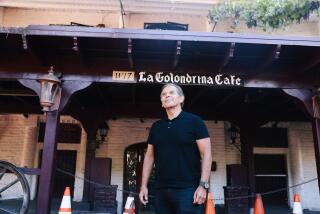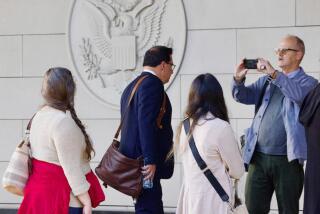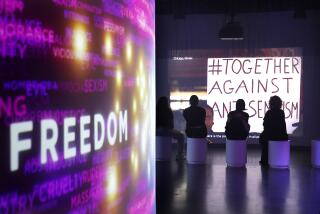‘Those were the halcyon days,’ lifelong Angeleno recalls

Francis A. Alonso grew up in Encino Hills, where he said everybody got along.
For Francis Alonso, growing up in the affluent neighborhood of Encino Hills was pure joy. It was a community of professionals, actors and artisans, and though largely Jewish, also was home to a dynamic cultural and religious hodgepodge.
There were Hungarians, Poles and Catholics of European and Latino descent, such as Alonso’s family, whose heritage includes roots from Spain, France and Mexico.
“The hills of Encino were filled with an amazing variety of people,” said Alonso, 61, a kite manufacturer. “Our neighborhood and the kids we played with, we all got along. We would be out all night. We would be skinny-dipping in our pools, going to our black-light rooms and listening to rock ’n’ roll, listening to the jukebox, eating French fries, trying to look good for the girls … worrying about things that don’t matter, like our hair and our clothes.”
As Alonso described it, “those were the halcyon days,” an idyllic period of calm and happiness.
“Certainly we were diving under our desks because we thought the Russians were going to bomb us … but none of that mattered,” he said. “Things were bucolic and peaceful in the neighborhood.”
The same could not be said for parts of inner-city Los Angeles, often racked by turmoil as African Americans and Mexican Americans struggled for political and social empowerment and civil rights.
Scenes of violence, such as what erupted during the 1965 Watts riots and in the nation’s South, played out on the Alonso family’s black-and-white TV, though they did little to disrupt the tranquility of neighborhoods like Encino Hills. They did, however, create a sense of national awareness for the young Alonso, who recalled his rage at seeing “whites hitting young black protesters in the South.”
“It just didn’t make any sense to me,” Alonso said.
The son of an engineer for Lockheed Martin Corp.’s Advanced Development Programs division, commonly known as Skunk Works, and a mother who sold artwork and imported furniture, Alonso attended St. John’s Military Academy from third through eighth grade.
The experience at the now-defunct Catholic military boarding school in Chatsworth that catered to 220 boys helped to instill discipline and a meticulous work ethic in Alonso.
He became an academy bugler “because the bugler had all sorts of privileges.” He was the first one out of the dorms each morning to blow reveille, the military bugle wake-up call, and last one at night to blow taps.
“So you had a lot of freedom, and your bugle gave you the ability to go places, to get out of class and blow all your calls,” Alonso said.
The highlight of the school year was the academy’s annual father-son banquet, in which Alonso got the opportunity to spend quality time with his dad, who often was traveling the globe, designing and building military aircraft, Alonso said.
Alonso enrolled at the USC’s film school but never graduated. Instead, he transitioned into a career in toy-making after a business plan he wrote for a college term paper turned into the blueprint for a successful kite-making venture. He produced more than 250 million kites over the years.
Still a resident of Los Angeles, Alonso marvels at how much the city has evolved, becoming even more of an ethnic melting pot while remaining a place that radiates hope and possibility.
“The demographics is the secret sauce of L.A.,” he said. “That’s what makes Los Angeles special. Also the opportunity. You’re here on the edge of the Pacific Rim. You’re here next to amazing universities and companies and people. I think Los Angeles is a place where you can manifest your desire, where you can accomplish your dreams.”
Follow me for the latest in video & multimedia reports
More to Read
Start your day right
Sign up for Essential California for news, features and recommendations from the L.A. Times and beyond in your inbox six days a week.
You may occasionally receive promotional content from the Los Angeles Times.







